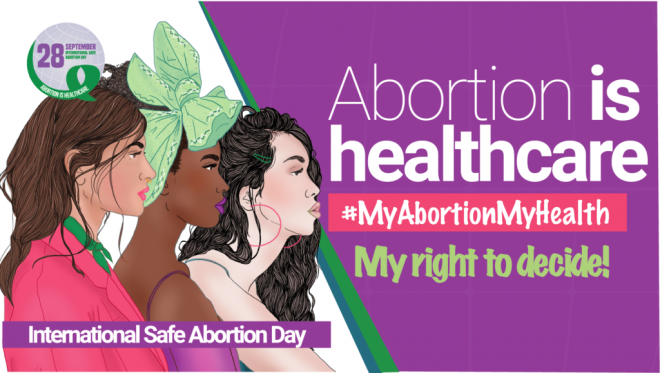Joint Civil Society Statement
42nd Session of the UN Human Rights Council
Internationale Safe Abortion Day - 28 September
In the Vienna Declaration and Programme of Action, States explicitly agreed to prioritize the
realization of women’s human rights and recognized that all human rights are universal,
indivisible, interdependent and interrelated. Yet, 26 years later, women and girls’ human rights
and bodily autonomy continue to be routinely violated, including through the denial,
criminalization and stigmatization of access to safe and legal abortion - all of which is rooted in
the discrimination, oppression, violence and coercion affecting the material conditions that
shape people’s lives and ability to exercise their bodily autonomy and human rights.
In 1994, Black feminists came together as the Women of African Descent for Reproductive
Justice, in reaction to the white supremacy, colonialism and capitalism they observed shaping
reproductive politics and inherent in the broader population control narratives. Reproductive
justice is centered on the rights to bodily autonomy and self-determination, and to parent and
not to parent in safe and healthy environments.
It is rooted in an intersectional analysis and moving beyond an individualistic conception of "choice” to instead place emphasis on the material conditions necessary to exercise reproductive rights. Reproductive justice also addresses the legacy of population control informed by white supremacy and replacement theory, which has resurfaced in current populist politics.
Reproductive justice is achieved when all people are able to enjoy their right to bodily autonomy
and sexual and reproductive self-determination. It requires people to enjoy economic, social, and
cultural rights and freedoms, and the ability to make and exercise choices not limited by
oppression, discrimination, stigma, coercion, violence, lack of opportunities or possible
consequences. Treaty bodies and special procedures have echoed this need and recognized that
the realization of women’s reproductive rights depends on the material conditions in which they
are born, grow, live, work and age, and on power structures and resource distribution at all levels2
- in other words, the social and other determinants of health.3 These include access to housing,
safe drinking water, effective sanitation systems, access to justice, and freedom from violence,
among other factors, and impact the agency that individuals can exercise with respect to their
sexual and reproductive health.4 Our discussions on abortion and sexual and reproductive rights
cannot continue ignoring these factors.
The realization of reproductive justice, the right to bodily autonomy and substantive equality also
requires freedom from control and interference by State and non-State actors, including private
companies, donors and multinational corporations, including criminalization of sexual and
reproductive behaviors and decisions, restrictive abortion laws, punitive sanctions, and legal
restrictions to regulate women’s control over their own bodies.5 These laws, policies and
practices typically target and disproportionately impact women of color, women from the Global
South, women with disabilities, women living in poverty, migrant women, ethnic minorities and
indigenous women, women living with HIV, young women and adolescents, sex workers and
gender-non-conforming persons based on racial, class, disability and gender stereotypes.6
Today, on 28 September, International Safe Abortion Day, we urge States to respect, protect and
fulfill women and girls’ human rights and realize reproductive justice for all.
We call on states to:
● Ensure access to available, accessible, acceptable and quality sexual and reproductive
health services as part of universal health coverage and public health systems, including
modern contraceptive options, comprehensive abortion and post-abortion care, financed
adequately through taxation and free from control from other governments, multilateral
agreements and transnational corporations.
● Remove all legal and social barriers to safe abortion, including its criminalization, which is
broader and including sanctions and no sanction regimes, and commit to providing safe
abortion services on request.
● Address social and other determinants of health in law and practice from an intersectional
perspective to ensure that they enable all individuals to effectively enjoy their sexual and
reproductive rights.
● Hold private companies and multinational corporations accountable for unethical research
practices, violations and abuses of women and girls’ reproductive rights and bodily
autonomy.
● Prioritize the meaningful participation of local movements, women human rights
defenders and feminists demanding accountability for sexual and reproductive health
and rights violations, and center their demands and recommendations for the realization
of reproductive justice.
